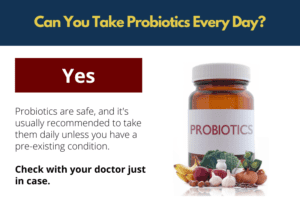Is Taking Probiotics Every Day Good For You?
Reader question: I’ve been hearing a lot about probiotics lately. Apparently, they’re really good for you and can help with all sorts of things, like digestion and keeping your gut healthy. One of the best ways to bolster your but health is through the benefits of ACV.
I decided to do some research on them and see if they could help me with some of my health issues.
It turns out that there are all sorts of different probiotics out there, each designed to target different areas of your health.
I decided to give one a try and see if it made a difference.
Well, my digestion improved significantly and I didn’t feel as bloated anymore. I also feel like I have more energy.
With all that said, I’m wondering if taking probiotics everyday would be good? Right now I’m taking them two or three times a week with food.
Can You take probiotics every day?

Yes, probiotics are safe, and it’s usually recommended to take them daily unless you have a pre-existing condition. Check with your doctor just in case.
What are probiotics and what do they do?
Probiotics are beneficial bacteria that have been found to improve gut health and digestion.
They can also help boost your immune system and fight off harmful bacteria.
The most popular food we eat with probiotics is yogurt, but there are plenty of other fermented foods out there.

And if you’re not a fan of the flavors of probiotic foods, supplements are simple to take and flavorless.
There are many different types of probiotics, and each one has unique benefits. Probiotics are constantly changing, so it is important to select the right one for your needs.
Probiotics In Everyday Foods

Here are the top 11 foods that contain probiotics:
1. Sauerkraut
2. Kefir
3. Pickles
4. Yogurt
5. Kimchi
6. Kombucha
7. Tempeh
8. Miso soup
9. Natto
11. Raw cheese
Probiotic supplements
If you’re not a fan of eating foods with probiotics, there are also probiotic supplements available on the market.
Probiotic supplements can be found in pill or powder form, and can be taken with food.
There are also many different variations of these probiotics, so it is important to do your research before purchasing one.
Be sure to look for a supplement that contains live and active cultures, as these are the most effective.
You should also look for a supplement that is specific to your needs.
For example, if you are looking to improve your digestion, look for a probiotic that specifically targets that area.

Probiotics are also available in different forms, such as capsules, powders, and liquids.
Daily Probiotic Use Benefits
Probiotic use is safe and beneficial for most people. However, some people may experience minor side effects, such as gas or bloating.
Here are 9 benefits of daily probiotics use:
1. Probiotics can help improve digestion and nutrient absorption.
2. Probiotics can help increase the body’s natural production of enzymes.
3. Probiotics can help improve immune function.
4. Probiotics can help reduce inflammation throughout the body.
5. Probiotics can help improve mental health and mood.
6. Probiotics can help improve skin health.
7. Probiotics can help reduce the risk of some chronic diseases.
8. Probiotics can help promote healthy pregnancy and childbirth.
9. Probiotics can help increase lifespan and protect against age-related decline.
Good Gut Bacteria Research
We all know that gut bacteria are important for our health, but did you know that they also play a role in our mood and overall sense of well-being?
In fact, recent studies have shown that gut bacteria can influence everything from our appetite to our risk of anxiety and depression.
So how do these microscopic organisms exert such a powerful influence over our lives?
The answer lies in the fact that gut bacteria produce a wide variety of chemicals that can affect both our brain and our body.
For example, some types of gut bacteria produce chemicals that act as neurotransmitters, sending signals to our brain that can impact our mood and behavior.
Other types of gut bacteria produce vitamins and minerals that are essential for good health.
So next time you’re feeling down, remember that it might not be just in your head – it could be your gut bacteria talking!
FAQ’s
Can long-term use of probiotics be harmful?
There is no evidence that long-term use of probiotics can be harmful.
Probiotics are generally considered safe and have been shown to be beneficial in a variety of settings.
However, more research is needed to determine the long-term safety and efficacy of probiotics.
If you have any concerns, speak with your healthcare provider.
Should a woman take a probiotic daily?
The answer to this question is not a simple yes or no.
The truth is, there is no one-size-fits-all answer to whether or not a woman should take a probiotic daily.
Some women may find that taking a probiotic every day helps them feel their best, while others may only need to take a probiotic occasionally.
Ultimately, it’s up to each individual woman to decide what works best for her.
What are the signs probiotics are working for me?
Some signs that probiotics are working for you include relief from gas, bloating, and diarrhea; a healthy appetite; and a good mood.
Probiotics may also help you lose weight and keep your skin healthy.
When is best time to take probiotics – on empty stomach or with meals?
Probiotics are most effective when taken on an empty stomach, at least 30 minutes before a meal.
That’s because the good bacteria in probiotics need time to get to your gut, where they can start working their magic.
Once there, these beneficial bacteria help to support digestive health, immune function, and more.
So if you’re looking to get the most out of your probiotic supplement, be sure to take it on an empty stomach!
What happens when you stop taking probiotics?
If you’ve been taking probiotics regularly, you might be wondering what will happen if you stop.
Will your gut bacteria go back to the way they were before you started supplementing? The answer is probably yes.
Probiotic supplements can help to temporarily increase the levels of good bacteria in your gut, but it’s unlikely that they will have a lasting effect.
Most research shows that the beneficial effects of probiotics only last for one to three weeks after supplementation is stopped.
So, if you’re thinking of taking a break from probiotics, there’s no need to worry – your gut bacteria will probably return to their normal state within a few weeks.
Who should not take probiotics?
People with compromised immune systems should not take probiotics, as they may be more susceptible to infection.
Additionally, people with bowel conditions such as Crohn’s disease or ulcerative colitis should not take probiotics, as they may worsen symptoms.
Pregnant women and young children should also avoid taking probiotics unless recommended by a healthcare professional.
